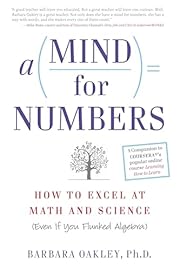

Click on a thumbnail to go to Google Books.
|
Loading... A Mind for Numbers: How to Excel at Math and Science (Even If You Flunked Algebra) (edition 2014)by Barbara Oakley PhD (Author)
Work InformationA Mind for Numbers: How to Excel at Math and Science (Even If You Flunked Algebra) by Barbara Oakley
 No current Talk conversations about this book.   ) )This book is an excellent mixture of knowledge and inspiration which should be taught as young as possible, worldwide. The interweaving of theory, examples and testimonies of scientists who were often late bloomers, clearly points towards a future where we'll laugh at our current misconceptions of intelligence and our ability to learn anything. "A Mind for Numbers" is a must-read for students of all ages wishing to improve their academic performance. The book is an enlightening exploration of the various cognitive processes our brain employs to facilitate learning. These include, Diffused and Focused Mode, Chunking, Interleaving, Spaced Repetition with Active Recall, and the Pomodoro Technique. The book's unique blend of insights and practical techniques makes it a must-read for students of all ages. What sets this book apart is the author's ability to not only explain these techniques but also reveal the fundamental reasons behind their effectiveness. Oakley's approach is refreshingly comprehensive, as she also addresses the issue of procrastination while sharing inspiring student stories. Emphasizing comprehension over rote memorization, the book empowers readers to develop a deeper understanding of the subjects they study. At the end of each chapter, concise summaries ensure that key takeaways are crystal clear. The "enhance your learning" sections further enrich the learning experience by prompting readers to actively engage with the content. "A Mind for Numbers" equips students with the tools needed to approach their academic challenges with renewed confidence. Whether struggling with math, science, or any subject, this book provides valuable insights that will unlock the path to academic excellence. In conclusion, "A Mind for Numbers" is an excellent choice for students seeking to elevate their learning experience and achieve remarkable academic success. The best practical guide for how to succeed at technical subjects that I've seen (and I've read a fair amount on this subject). Research backed, including lots of stuff I've read elsewhere, but condensed down to solid, practical advice with just a bit of research backstory (many of the other books I've read go into greater detail on the research methodologies, which is great but not really what you care about when you're actively struggling with learning tricky algorithms or writing tough proofs and trying to figure out what you can do to get better). I'd recommend this to anyone studying Math, Computer Science, Physics, or other technical subjects (and have been actively recommending it to my coding bootcamp students). The book focuses on math, but the techniques apply elsewhere. no reviews | add a review
Mathematics.
Self-Improvement.
Nonfiction.
HTML:The companion book to COURSERA®'s wildly popular massive open online course "Learning How to Learn" Whether you are a student struggling to fulfill a math or science requirement, or you are embarking on a career change that requires a new skill set, A Mind for Numbers offers the tools you need to get a better grasp of that intimidating material. Engineering professor Barbara Oakley knows firsthand how it feels to struggle with math. She flunked her way through high school math and science courses, before enlisting in the army immediately after graduation. When she saw how her lack of mathematical and technical savvy severely limited her options—both to rise in the military and to explore other careers—she returned to school with a newfound determination to re-tool her brain to master the very subjects that had given her so much trouble throughout her entire life. In A Mind for Numbers, Dr. Oakley lets us in on the secrets to learning effectively—secrets that even dedicated and successful students wish they’d known earlier. Contrary to popular belief, math requires creative, as well as analytical, thinking. Most people think that there’s only one way to do a problem, when in actuality, there are often a number of different solutions—you just need the creativity to see them. For example, there are more than three hundred different known proofs of the Pythagorean Theorem. In short, studying a problem in a laser-focused way until you reach a solution is not an effective way to learn. Rather, it involves taking the time to step away from a problem and allow the more relaxed and creative part of the brain to take over. The learning strategies in this book apply not only to math and science, but to any subject in which we struggle. We all have what it takes to excel in areas that don't seem to come naturally to us at first, and learning them does not have to be as painful as we might think. No library descriptions found. |
Current DiscussionsNonePopular covers
 Google Books — Loading... Google Books — Loading...GenresMelvil Decimal System (DDC)501.9Science Science Philosophy and theory PsychologyLC ClassificationRatingAverage: (3.91) (3.91)
Is this you?Become a LibraryThing Author. |
||||||||||||||||||||||||||||||||||||||||||||||||||||||||||||||||||||||||||||||||||||||||||||||||||||||||||||||||||||||||||||||||||||||